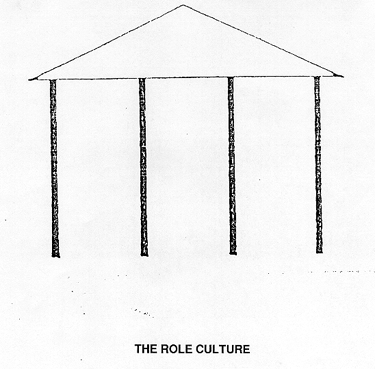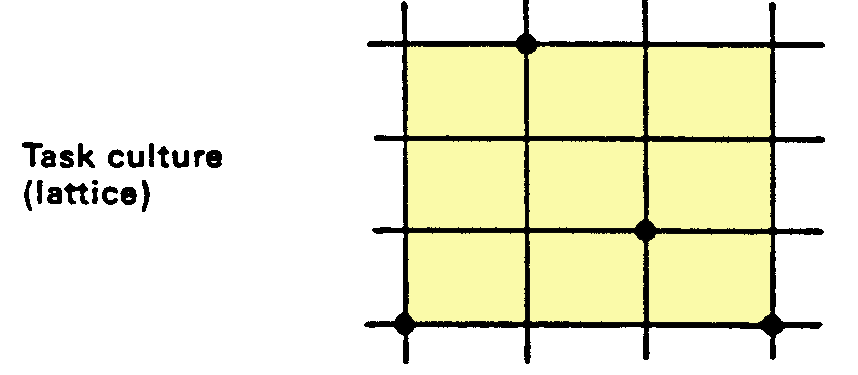Why should we understand cultural types to develop strong partnerships with suppliers?
Before entering a partnership, it’s important to understand your partners. Otherwise, the relationship may quickly fall apart. This concept also applies to personal life, many couples break up due to conflicting mindsets. Therefore, understanding your partner’s culture is crucial. This is especially true during negotiations: when you’re aware of a supplier’s cultural background, you can anticipate their negotiation style and the authority of their representatives in the negotiation. According to Charles Handy, there are four main types of organizational culture: power, task, role, and person.
Power culture

In a power culture, decision-making authority is often concentrated in one person or a small group. In the image, a focal point represents the individual with the highest power in the company. They are involved in nearly all aspects of the business, and the organization typically follows their direction. This type of culture is common in small companies or start-ups with fewer employees and a limited business scale. If your partner operates within this kind of culture, it’s advisable to connect directly with the head of the company because most decisions can be made quickly when you negotiate with them.
Role culture

As you can see in the image, role culture refers to an organization with a clear hierarchy. The organization is divided into various departments which are assigned specific roles and functions. Every department holds distinct authorities. Operations are carried out according to established procedures and policies.
This culture is highly bureaucratic, so all work tasks must follow established procedures and rules. For example, if you negotiate with a sales manager in such an organization, he can only provide information or make decisions within his scope of authority. If you request something that affects the production plan or profitability, he must seek approval from company executives and other departments. This process can take a significant amount of time.
This type of culture is commonly found in large companies or government agencies.
Task culture

Normally, we often observe task culture within project-based teams, where individuals are assigned specific tasks to achieve a common goal. Each member brings unique expertise and abilities, contributing different values to the project. This culture requires collaboration and accountability from all team members. Within this environment, teams are flexible and adapt well to external changes because decisions are made by these individuals, without the need for approval from various departments. Once the project is completed, the team disbands.
For example, a team may be assembled to launch a new product. Data analysts, engineers, and designers are included in the group. Each person contributes their unique skills to ensure the product is launched successfully within the given timeframe.
When working with a supplier that operates with a task culture, it’s important to understand that they value expertise and competence over hierarchical positions. They maintain clear objectives and timelines for each project, so you’ll need to prepare well-researched and clearly structured content before entering any negotiations.
Person culture

In this culture, individuals’ goals are prioritized over the organization’s objectives. They have the freedom to choose their working methods, timelines, and clients, as long as they fulfill their goals. They work independently due to their profound knowledge and high competence.
You may encounter this culture in law consultancy firms, where lawyers can freely take on cases based on their abilities. They also have the liberty to set their own legal fees. In this environment, individuals are expected to continuously update their knowledge and innovate their working methods to achieve specific goals. Otherwise, they may be replaced by others with superior skills.
When working with a supplier that operates within a person-oriented culture, it’s important to research the individuals in the company, not just the company itself, especially the person you’ll be working with directly. They feel respected and valued when you show interest in their values, backgrounds, and goals.
In the exam, CIPS may ask questions about types of organizational culture. These questions typically focus on the definitions and drawbacks of each culture type. If you grasp the basic knowledge of these concepts, you can easily score marks in the exam.
We provide CIPS practice questions with answers and detailed explanation, besides they are updated regularly to reflect the actual exam. If you want to consolidate your knowledge before the exam, you can check the links below. The discount code is MASTEREXAM25.
L4M1: https://www.udemy.com/course/cips-l4m1-practice-test-short-learning-guide/?couponCode=MASTEREXAM25
L4M2: https://www.udemy.com/course/cips-diploma-l4m2-practice-test/?couponCode=MASTEREXAM25
L4M3: https://www.udemy.com/course/cips-diploma-practice-test-commercial-contracting/?couponCode=MASTEREXAM25
L4M4: https://www.udemy.com/course/cips-diploma-practice-test-ethical-responsible-sourcing/?couponCode=MASTEREXAM25
L4M5: https://www.udemy.com/course/cips-practice-test-commercial-negotiation/?couponCode=MASTEREXAM25
L4M6: https://www.udemy.com/course/cips-diploma-practice-test-supplier-relationships/?couponCode=MASTEREXAM25
L4M7: https://www.udemy.com/course/level-4-diploma-whole-life-asset-management-l4m7/?couponCode=MASTEREXAM25
L4M8: https://www.udemy.com/course/cips-l4m8-practice-in-procurement-and-supply/?couponCode=MASTEREXAM25
L5M1: https://www.udemy.com/course/updated-l5m1-full-course-managing-teams-and-individuals/?couponCode=MASTEREXAM25
L5M2: https://www.udemy.com/course/cips-l5m2-daniel-do/?couponCode=MASTEREXAM25
L5M3: https://www.udemy.com/course/l5m3-daniel/?couponCode=MASTEREXAM25
L5M4: https://www.udemy.com/course/l5m4-advanced-contract-and-finance/?couponCode=MASTEREXAM25
L5M5: https://www.udemy.com/course/l5m5-daniel/?couponCode=MASTEREXAM25
L5M15: https://www.udemy.com/course/updated-cips-l5m15-practice-questions-advanced-negotiation/?couponCode=MASTEREXAM25